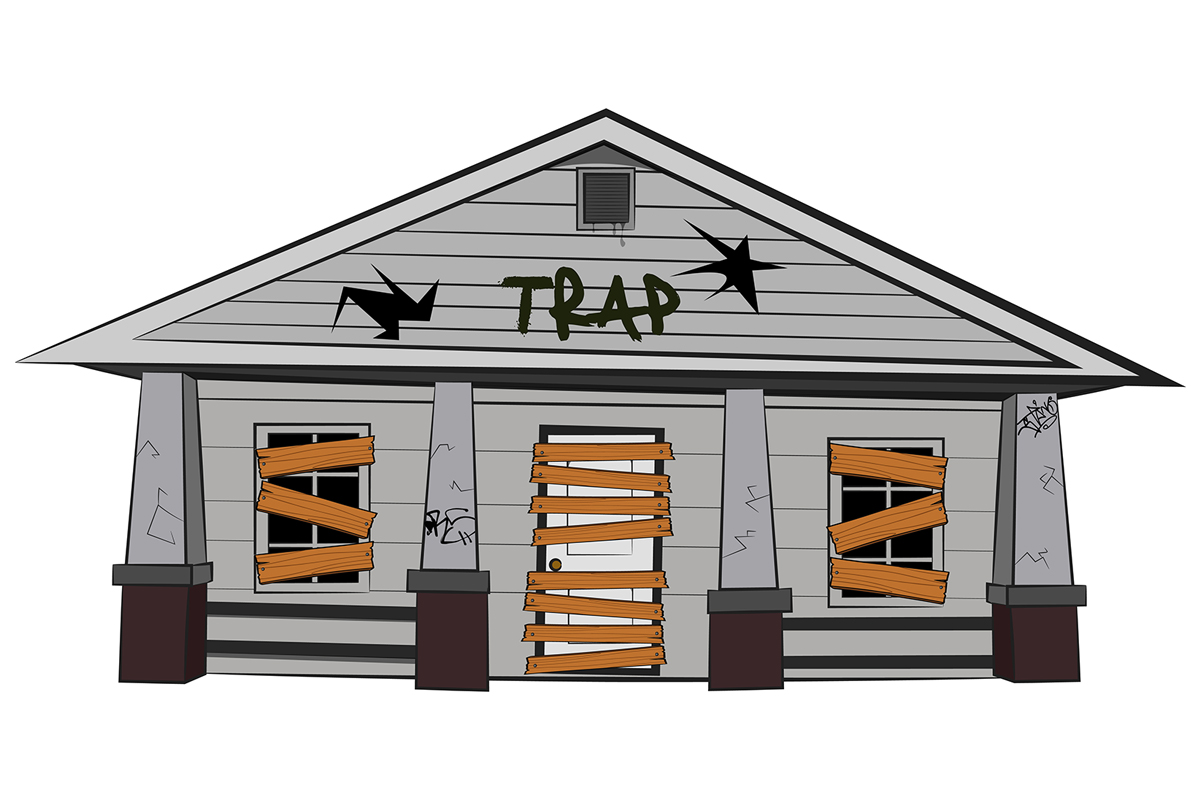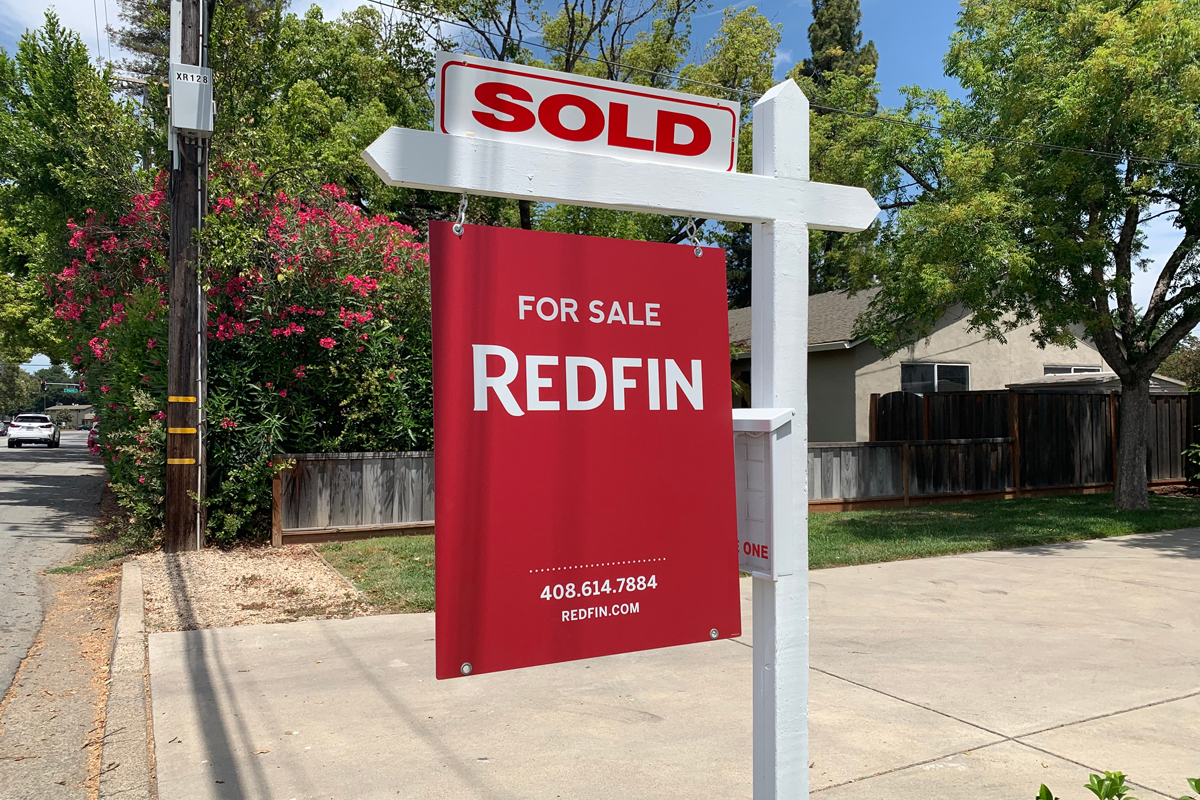
Trapped by a Good Deal: The Lock-in Effect Gripping the Housing Market
The American dream of owning a home has always been a central part of our culture. However, recent events in the housing market Read more...
Trapped by a Good Deal: The Lock-in Effect Gripping the Housing Market
The American dream of owning a home has always been a central part of our culture. However, recent events in the housing market have created a peculiar situation where many homeowners find themselves "trapped" in their homes, having secured incredibly low mortgage rates during the pandemic. Just when you thought you had learned all the real estate vocabulary out there, there is a new term known as the "lock-in effect," which is causing ripples throughout the housing market and the broader economy.
What is the Lock-in Effect?
Imagine you bought (or refinanced) a house a few years ago when interest rates were at historic lows, say around 3%. You're now sitting pretty with a fantastic mortgage deal. However, interest rates have since skyrocketed to around 7%. If you were to sell your home and buy a new one, you'd be forced to take out a new mortgage at this much higher rate, likely increasing your monthly payments. This financial reality is discouraging many homeowners from moving, even if they want to.
This hesitation to sell is causing a ripple effect throughout the housing market. Fewer homes are being put up for sale, leading to decreased inventory and increased competition among buyers. This, in turn, drives up prices, making it even harder for first-time buyers to enter the market. The lock-in effect is estimated to have prevented around 1.3 million home sales from spring 2022 to the end of 2023.
Why is This Happening Now?
The lock-in effect is not a new phenomenon, but its current scale is unprecedented. Several factors have contributed to this situation:
Historically Low Rates: The pandemic-era interest rates were exceptionally low, enticing many to purchase homes or refinance existing mortgages.
Rapid Rate Increase: The Federal Reserve's efforts to combat inflation have led to a rapid increase in interest rates, creating a stark contrast with the locked-in rates many homeowners enjoy.
Long Mortgage Terms: Most mortgages in the US are 30-year fixed-rate loans, meaning the low rates secured during the pandemic will remain in effect for many years.
The Impact on Homeowners
While having a low mortgage rate might seem like a blessing, the lock-in effect has created several challenges for homeowners:
Limited Mobility: Homeowners who want to move for better jobs, downsize, or upsize find themselves financially constrained by their low mortgage rates.
Missed Opportunities: They may be missing out on potentially better housing situations or career advancements due to their reluctance to sell.
Financial Stress: The knowledge that moving would significantly increase their housing costs can cause stress and anxiety.
Broader Economic Consequences
The lock-in effect doesn't just impact individual homeowners. It has far-reaching consequences for the economy:
Decreased Labor Mobility: The inability of homeowners to relocate for better job opportunities can hinder economic growth and productivity.
Wage Stagnation: When workers are unable to move to areas with higher wages, it can contribute to wage stagnation.
Reduced Economic Activity: Fewer home sales mean less spending on furniture, appliances, and other related goods and services, impacting various industries.
What Can Be Done?
President Biden has acknowledged the issue and proposed temporary tax credits to incentivize new home buyers and sellers. However, the effectiveness of this measure remains to be seen. Some economists argue that the lock-in effect is likely to persist until interest rates decrease or stabilize, which may take time.
In the meantime, homeowners who are considering selling their homes need to carefully weigh the financial implications. While moving might mean giving up a great mortgage rate, it could also open up new opportunities and improve their overall quality of life. It's essential to consult with financial advisors and real estate professionals to make informed decisions.
The Bottom Line
The lock-in effect is a complex issue with no easy solutions. While it presents challenges for homeowners and the housing market, it also underscores the importance of understanding the long-term implications of financial decisions, especially when it comes to something as significant as a mortgage. As the market evolves, it will be interesting to see how this phenomenon plays out and what measures will be taken to address its consequences.
Love,
Kartik
|

Understanding how local education is funded in California is not just crucial, it's empowering for homeowners, parents, voters, and even those in real estate license schools. One of the key components Read more...
Understanding how local education is funded in California is not just crucial, it's empowering for homeowners, parents, voters, and even those in real estate license schools. One of the key components of this funding comes from property taxes. I wanted to write an article to explain how property taxes contribute to local education funding, what that means for your community, and why every Californian should be informed. By understanding this, you gain the power to influence and shape your community's educational landscape.
Understanding Property Taxes
Property taxes are levied on all real estate by governments and primarily used to fund various local services, including schools, roads, and public safety. For homeowners, understanding property taxes is crucial as it directly impacts their financial obligations and property values. In California, property taxes are calculated based on the assessed value of your property, with rates varying by location but typically set at around 1% of the assessed value due to Proposition 13, which was passed in 1978.
The Connection Between Property Taxes and Education Funding
Allocation of Funds
A significant portion of property taxes are allocated to public schools. The exact percentage can vary depending on the municipality and the community's needs. Generally, these funds are used to cover expenses such as:
Teacher salaries
School supplies
Building maintenance and repairs
Technology upgrades
Extracurricular activities
Local Control Funding Formula (LCFF)
In 2013, California implemented the Local Control Funding Formula (LCFF), significantly changing how state education funds are distributed to public schools. LCFF aims to provide a more equitable, student-focused approach to school funding and increases the importance of local property taxes as they contribute to the base grants that every school receives.
Before 2013, all public schools in California got money from the state based on a system that some people thought was confusing and unfair. In 2013, California started using a new system called the Local Control Funding Formula, or LCFF for short, to make things more fair.
Here's how LCFF works:
More Money Where It's Needed: LCFF ensures that schools receive money based on their students' specific needs. Schools with more students who need extra help (like those learning English as a second language, coming from low-income families, or being foster children) receive more money. This helps ensure that all students have a fair chance at a good education.
Local Control: Under LCFF, local communities have more say in how their schools use the money. This means parents and teachers can have a more significant impact on deciding what the school needs most.
Property Taxes: The money that schools get from LCFF includes a base amount that comes partly from local property taxes. This means that the money collected from homeowners in the area helps to fund the local schools. Since each area might have different property tax income, this still ties school funding somewhat to a neighborhood's wealth, but LCFF helps balance it out with extra funds where they're needed most.
In simple terms, LCFF was created to ensure that money for schools is shared more fairly, focusing more on what students in each school actually need to succeed. This system, with its focus on fairness and equity, should reassure you that every child, regardless of their background, has an equal opportunity to succeed in their education.
Impact on Quality of Education
The quality of local schools often reflects the community's property tax base. Neighborhoods with higher property values generate more tax revenue, which can lead to better-funded schools and, typically, better educational outcomes. This disparity highlights the importance of understanding and participating in local tax discussions and assessments.
In California, the relationship between property values, local property taxes, and school quality is complex due to the state's unique tax laws, specifically the implications of Proposition 13. Passed in 1978, Proposition 13 caps the amount that property taxes can increase each year, regardless of increases in property values. This means that, unlike many other places, rising property values in California do not automatically lead to proportionally increased property tax revenues.
However, areas with higher property values still tend to have better-funded schools for a couple of reasons:
Higher Baseline Taxes: Even with Proposition 13, neighborhoods with higher property values start from a higher baseline tax amount, which provides more funding to local schools.
Local Funding Measures: Communities with higher property values often pass local parcel taxes or bond measures to fund schools, which go beyond the limitations set by Proposition 13. These measures are typically voted on in local elections and can significantly impact school budgets.
A prime example is Palo Alto in Silicon Valley. Despite Proposition 13's limitations, the city's schools benefit from a community with high property values and strong support for education, often reflected in local voting patterns favoring school funding measures. This results in Palo Alto schools having more resources and generally better performance compared to schools in less affluent areas.
Why Every Californian Should Care
Educational Equity
Understanding how property taxes impact local schools is key to addressing educational equity. Advocating for fair property assessments and equitable funding formulas can help ensure all children receive a quality education.
Home Values
Good schools increase property values. Homeowners should understand how supporting their local schools through property taxes can help their long-term value.
In many communities, a cycle begins with high property values, which lead to better-funded schools through higher property tax revenues and community support for school-related funding measures. As these schools improve — with better facilities, more resources, and qualified teachers — they enhance the educational outcomes and reputation of the district.
This reputation for excellent education increases the neighborhood's attractiveness to prospective homeowners, particularly those with children, looking for the best possible schooling options. This demand further drives up property values, enhancing the tax base and providing even more school funding.
Thus, a self-reinforcing cycle is established: higher property values finance better schools, which in turn boost property values even more. Homeowners benefit from this cycle, as the continuous improvement in school quality helps sustain and increase their property's value over time. This makes support for local schools through property taxes and other funding initiatives not just a matter of civic duty but a wise investment that promotes a cycle of mutual benefit between educational institutions and property owners.
Why Real Estate Agents Should Care
Educating Clients: Real estate agents need to provide accurate and comprehensive information to their clients. Knowing the specifics of property taxes helps agents explain potential costs associated with owning a property. This is especially important for buyers moving from different states or regions where tax rates and structures might differ significantly.
Assessing Property Value: Property taxes are often based on assessed property values. Agents who understand how these assessments are conducted can better evaluate and compare property values, which is essential for advising clients on buying and selling properties.
Budget Planning: For many homeowners, property taxes represent a significant portion of their annual housing expenses. Agents must be able to help clients estimate these costs accurately so they can budget appropriately. This is particularly important in areas with high tax rates or where property values rapidly increase.
Understanding Community Benefits: Property taxes typically fund critical local services and infrastructure, such as public schools, police and fire departments, and public parks. A real estate agent who can articulate what these taxes contribute can provide deeper insights into the quality of life in a particular community. This knowledge can be a deciding factor for buyers considering different neighborhoods.
Negotiating Deals: Knowledge of how property taxes impact a real estate deal is vital. For instance, if an area is due for a tax reassessment or has pending tax legislation, this could affect the buyer's willingness to close a deal at a proposed price. An informed agent can negotiate better terms by anticipating changes in property taxes.
Investment Insight: Investors often look to real estate agents for advice on properties that offer the best return on investment. Understanding property taxes helps agents recommend investments wisely, considering the long-term tax implications and the potential for property tax hikes.
Market Trends: Changes in property tax policies can influence real estate market trends. Agents aware of these changes can better predict market movements and advise clients when to buy or sell to maximize their financial outcomes.
Overall, an in-depth understanding of property taxes enhances a real estate agent's professionalism and capability to provide strategic advice, thus fostering client trust and credibility.
Property taxes play a crucial role in funding local education in California. By understanding this role, Californians can make informed decisions that support their communities and foster educational environments where all students thrive.
Love,
Kartik
|

Finding Your Dream Home: The Joy and the Jolt
You've done it. After countless open houses, endless online listings, and what felt like an eternal waiting game, you finally found your dream home. The Read more...
Finding Your Dream Home: The Joy and the Jolt
You've done it. After countless open houses, endless online listings, and what felt like an eternal waiting game, you finally found your dream home. The excitement was palpable as your offer was accepted, the contract signed, and the future seemed to paint itself in bright, hopeful colors.
But then, a twist in the tale: the appraisal comes in, and it's lower than your purchase price. This news jolts you, shaking your excitement. It's a scenario many homebuyers fear, yet few are prepared for. It's not just about numbers; it's about your dreams, hopes, and vision for your future.
The Safety Net: Understanding the Appraisal Contingency
In these moments of uncertainty, your appraisal contingency becomes more than just a clause in a contract; it's a lifeline. This contingency is a crucial aspect of the home-buying process, designed to protect you, as the buyer, from overpaying.
But what exactly is an appraisal contingency? In simple terms, it's a condition in your home buying contract stating the purchase is contingent on the property being appraised at or above the agreed-upon sale price. If the appraisal falls short, this clause gives you the power to renegotiate or even walk away from the deal without penalty - more on that later.
More Than Just Money: The Psychological Impact
Beyond its financial safety, an appraisal contingency is also about peace of mind. It's a buffer against the unforeseen, a guard against the unpredictable nature of real estate valuations. When the appraisal comes in low, it's easy to feel overwhelmed and unsure. This clause serves as a reminder that you have options and are not locked into a potentially unfavorable situation.
Navigating the complexities of a low appraisal can be challenging, but understanding the role and power of your appraisal contingency is the first step.
As we delve deeper into this guide, we'll explore how to handle the gap between appraised value and offer price, examine your options under the appraisal contingency, and equip you with the knowledge to make the best decision for your future.
Dealing with the Gap: Understanding and Managing the Discrepancy
The Dilemma of Differing Values
When faced with a lower-than-expected appraisal, you encounter a fundamental dilemma: the gap between the appraised value and your offer price. This discrepancy isn't just a set of numbers but a potential challenge to your home-buying journey.
Appraised Value vs. Offer Price
The appraised value of a property is an expert's opinion of its worth, whereas the offer price is what you're willing to pay for it. These two figures ideally should align closely, but when they don't, it's crucial to understand what each represents. The appraised value is grounded in thoroughly analyzing the property and market conditions. At the same time, the offer price can sometimes reflect more subjective factors like personal desire or market competition.
Common Reasons for a Low Appraisal
Understanding why appraisals come in low can help you navigate this situation more clearly. Here are some common reasons:
Market Fluctuations: Real estate markets are dynamic, and rapid changes can lead to disparities between current market conditions and recent sales data used by appraisers.
Property Condition: If the appraiser notes issues with the property that you, the home inspector, or the seller might have missed, it can affect the appraisal value.
Comparable Sales (Comps): Appraisers generally use recent sales of similar properties in the area (comps) to determine value. If there are few comps or if they sold at lower prices, it can impact your appraised value.
Inaccurate Listing Information: Sometimes, discrepancies in square footage, room count, or amenities between the listing information and the actual property can lead to a lower appraisal.
Navigating the Appraisal Report with Your Agent
There needs to be more than just knowing the appraised value; understanding why it is key. This is where reviewing the appraisal report with your real estate agent becomes invaluable. Your agent can help interpret the report, point out areas that might be disputed, and provide insight into the appraiser's reasoning. This knowledge is crucial for your next steps, whether challenging the appraisal, renegotiating the deal, or even deciding to walk away.
Your Options with an Appraisal Contingency
When faced with a low appraisal, your appraisal contingency clause becomes a critical tool, offering you several paths to consider. Each option carries its own set of considerations and potential outcomes.
Option 1:
Walking Away: This option offers a clean break. Assuming you still have your appraisal contingency intact, you reclaim your earnest money deposit and walk away from the deal, free to explore other opportunities. Consider this path if the gap between the offer and the appraised value is significant, exceeding your budget, or if the appraisal highlights major concerns. While finding another suitable home in a competitive market might take time, the financial and emotional security gained can be invaluable.
The Benefits of Opting Out
Financial Protection: Assuming that your appraisal contingency is still in play, walking away allows you to reclaim your earnest money deposit, safeguarding your finances.
Avoiding Overpayment: You avoid overpaying for a property, which could have long-term financial implications.
Opportunity to Reassess: This situation allows you to reassess your options and find a better fit.
Considering the Drawbacks
Market Challenges: In a competitive market, finding another suitable property might take time and effort.
Emotional Impact: Letting go of a home you've become attached to can be emotionally challenging.
Option 2:
Paying the Difference: This option demands serious financial consideration. If the gap is manageable and aligns with your long-term budget, it can still lead to securing your dream home. However, be meticulous in your calculations. Factor in additional costs like closing fees, potential repairs identified in the appraisal, and the impact on your future financial stability. Consulting your financial advisor is crucial to ensure this decision is manageable for your resources later.
Financial Implications
Immediate Costs: Paying the difference (the amount between the contract price and the appraised amount) means more upfront cash, which can strain your budget.
Long-Term Considerations: This decision could impact your property equity.
Making a Responsible Decision
Financial Planning: Carefully consider your financial situation and future implications.
Seeking Advice: Consulting with trusted advisors can provide clarity.
Option 3:
Renegotiating: This option leverages your appraisal contingency as a negotiation tool. Armed with the appraiser's report, you can present a compelling case to the seller highlighting the discrepancy between the offer and the property's actual market value. Be prepared to compromise – offering alternative solutions like a lower price, closing date adjustments, or repair credits in exchange for a price concession. Remember, a win-win outcome benefits both parties and increases the chances of reaching an agreement.
The Power of Negotiation
Leveraging the Report: Use the appraisal report findings to negotiate a fairer price with the seller.
Finding Compromise: Aim for a win-win situation where both parties feel satisfied with the outcome.
Strategy and Compromise
Presenting Your Case: Be clear and factual when presenting your case based on the appraisal report.
Flexibility and Creativity: Consider other aspects of the deal where you can compromise, such as closing dates or repair credits.
Ultimately, the best decision is the one that aligns with your unique circumstances and risk tolerance. Consider these factors:
Financial Situation: Can you comfortably absorb the difference in price or additional costs?
Market Conditions: Is the market hot or cooling? Is finding another suitable property feasible?
Emotional Attachment: How attached are you to this specific property? Is it worth compromising for?
Alternative Options: Have you explored other properties that suit your budget and needs?
Timeframe: Your appraisal contingency period sets a deadline for making a decision. Utilize it effectively to gather information and weigh your options.
Remember, your real estate agent and advisors are valuable allies in this process. Feel free to use their expertise and experience to analyze your options and make the most informed decision. With a clear head, careful consideration, and the power of your appraisal contingency, you can navigate this unexpected turn and confidently choose the path that leads to your ideal home.
Negotiation Tactics with Your Appraisal Contingency in Play
With a low appraisal comes the opportunity to flex your negotiation muscles, and your appraisal contingency is your secret weapon. Here are some tips to wield it effectively:
1. Know Your Numbers: Thoroughly understand the appraised value, its reasons, and how much you're willing to budge. Present factual evidence from the appraisal report to support your arguments.
2. Be Assertive, Not Aggressive: Approach the seller confidently but maintain a respectful tone. Remember, your goal is to reach a mutually beneficial agreement, not to burn bridges.
3. Focus on Solutions, Not Demands: Instead of simply demanding a lower price, offer alternative solutions like extending the closing date, taking on some repairs identified in the appraisal, or contributing a closing cost credit.
4. Be Prepared to Walk Away: While compromise is key, know your bottom line and walk away if the seller isn't willing to meet your needs. Your appraisal contingency empowers you to do so without penalty.
5. Leverage Your Agent's Expertise: Your real estate agent can act as a mediator, facilitating communication and helping you reach a fair deal. Feel free to rely on their experience and negotiation skills.
6. Consider Professional Appraisers: If you have doubts about the original appraisal, you can hire a second appraiser for a different perspective. However, weigh the cost of a second appraisal against the potential benefits of its findings.
7. Keep Emotions in Check: While feeling attached to the property is natural, don't let emotions cloud your judgment. Stick to your budget and financial goals, and decide based on logic and data.
8. Use Time to Your Advantage: Your appraisal contingency gives you a timeframe to gather information, negotiate, and make a well-informed decision. Don't feel pressured to rush into anything.
9. Document Everything: Keep clear records of all communication with the seller and your agent, including any proposed settlements or agreements. This protects you in case any disputes arise later.
Remember, successful negotiation is a balancing act. By presenting a solid case, remaining flexible, and strategically leveraging your appraisal contingency, you can turn a low appraisal into an opportunity to negotiate the right deal.
Embracing the Crossroads
A low appraisal can feel like a roadblock, throwing a wrench into your dream home journey. But remember, it's not a dead end; it's a crossroads. With your trusty appraisal contingency by your side, you have the power to navigate this unexpected turn and choose the path that leads to your ideal future.
Whether you walk away with your deposit intact, bridge the gap and secure your dream home, or negotiate a win-win with the seller, remember that this decision is about more than just bricks and mortar. It's about your finances, emotional well-being, and long-term goals.
This unexpected curve in the road might lead you to a better destination than you imagined. Another property awaits, perfectly aligning with your needs and budget, with an appraisal that sings your praises. Or, after careful consideration, you decide that this house, with its quirks and charms, is worth the extra effort.
So take a deep breath, trust your instincts, and embrace the crossroads. While filled with twists and turns, the journey to your dream home can be enriching when you chart your course.
Love,
Kartik
|

What is a real estate appraisal?
In real estate, an appraisal is a cornerstone. A real estate appraisal is a professional assessment of a property's market value conducted by a licensed real estate Read more...
What is a real estate appraisal?
In real estate, an appraisal is a cornerstone. A real estate appraisal is a professional assessment of a property's market value conducted by a licensed real estate appraiser This report is important to a variety of stakeholders in various situations, whether you're buying, selling, refinancing, or managing real estate investments.
For buyers, an appraisal offers a clear picture of whether the property is worth the investment. While the listing agent typically recommends a list price, sellers also can gain insights into setting a competitive and realistic price based on location, size, and condition. Most commonly, lenders use these appraisals to determine the viability and value of a property as collateral for loans.
Real estate appraisals provide a snapshot of a property's worth in the current market, offering a critical data point that influences decision-making in the dynamic real estate landscape.
Whether you are preparing for the real estate license exam a first-time homebuyer, a seasoned investor, or a curious reader, understanding the nuances of real estate appraisals is an invaluable part of navigating the property market successfully.
What is a Real Estate Appraisal?
Real estate appraisals, a fundamental subject taught in real estate school, play a pivotal role in the dynamics of property transactions. They influence the decisions of buyers, sellers, and lenders in distinct ways by providing an objective basis for decision-making. This ensures that all parties are well-informed about the actual value of the property in question.
Key components of a real estate appraisal include several critical elements:
Property Inspection: The appraiser conducts a thorough examination of the property, assessing its condition, size, location, and unique features. This physical inspection is a significant part of the appraisal process.
Market Analysis: The appraiser analyzes current market trends, including comparable sales data of similar properties in the area. This comparison helps evaluate how the subject property stacks up against others in the same market.
Documentation and Reporting: The appraiser compiles the data collected during the inspection and analysis into a detailed appraisal report. This report outlines the appraiser's findings and provides a final estimation of the property's value.
Professional Expertise and Standards: Appraisals are conducted by licensed professionals who adhere to standardized methods and ethical practices. Their expertise in property valuation ensures that the appraisal is reliable and compliant with industry standards.
A real estate appraisal is a comprehensive, pivotal real estate market evaluation. It provides a clear, professional assessment of a property's value, taking into account various factors like location, property size and market conditions.
For anyone involved in a real estate transaction, understanding the intricacies of the appraisal process is key to ensuring fair and informed decisions.
Who Typically Hires the Appraiser?
Lenders are who commonly engage appraisers in real estate transactions, particularly for mortgages, to assess the risk associated with the loan. This process ensures that the amount of money lent aligns with the property's actual market value. The appraisal, conducted by an independent professional, objectively evaluates the property's worth. This is crucial for the lender to determine the loan-to-value ratio, a critical factor in loan approval and risk management. Essentially, the appraisal safeguards the lender, ensuring they do not extend more credit than the property is worth, thus protecting their financial interests.
Imagine you want to buy a house that's listed for sale at $300,000. To purchase this house, you approach a bank for a mortgage. The bank, before lending you the money, wants to make sure that the house is really worth $300,000. So, the bank hires an independent appraiser to evaluate the house's value.
The appraiser looks at the house, considering factors like location, size, condition, and compares it to similar houses that have recently sold in the area. Suppose the appraiser determines that the house is indeed worth $300,000. The bank then feels confident to proceed with the loan, knowing that if you fail to pay the mortgage, they can sell the house and recover their money, as the house's value matches the loan amount.
However, if the appraiser finds that the house is only worth $250,000, the bank faces a higher risk. If they lend you $300,000 but you later default on the mortgage, the bank might not be able to recoup the full loan amount by selling the house. In such cases, the bank might offer a smaller loan or ask for a higher down payment to reduce their risk. This shows how appraisals protect lenders from loaning more money than a property is worth.
The Appraisal Process Explained
Understanding the step-by-step process and some basic real estate terms can significantly demystify what goes into determining a property's value. This insight is crucial whether you're a buyer assessing a potential investment, a seller setting a price, or a lender evaluating loan risk. Central to this process is the role of a licensed real estate appraiser whose expertise and impartial assessment are vital for an accurate and fair appraisal.
Engagement of a Licensed Appraiser: The process begins when a licensed appraiser is hired, typically by the lender or sometimes by the buyer or seller. The appraiser must be a professional with the credentials and knowledge of local market trends to ensure a reliable appraisal.
Collection of Preliminary Data: The appraiser starts by gathering basic information about the property, such as its location, size, and unique features. This initial data forms the foundation of the appraisal process.
Physical Inspection of the Property: The appraiser conducts an on-site visit to inspect the property thoroughly. This includes examining the interior and exterior, noting the property's condition, size, layout, and any improvements or unique features. This step is crucial in assessing the property's current state and its impact on value.
Market Research and Analysis: The appraiser then delves into market research, analyzing current real estate market trends and comparable sales data. This involves studying recent sales of similar properties in the area to help determine a fair market value for the subject property.
Preparation of the Appraisal Report: After the inspection and research, the appraiser compiles their findings into a detailed appraisal report. This report includes an analysis of the property and the market and the appraiser's final estimate of the property's value.
Review and Finalization: The completed report is then reviewed for accuracy and compliance with industry standards. Once finalized, it is submitted to the client thereby providing a professional, unbiased property valuation.
The appraisal process is a blend of professional evaluation, market analysis, and reporting. It is a critical component in the real estate industry, providing assurance and clarity to all parties involved in a property transaction.
Factors Affecting Property Value in an Appraisal
In real estate appraisal, understanding the factors influencing property valuation is critical. A real estate appraiser considers numerous aspects during the home appraisal process, each significant in determining the outcome. Let's delve into some of these crucial factors:
Location: Often touted as the most critical factor in property valuation, the location of a property significantly impacts its appraised value. This includes the neighborhood's desirability, proximity to amenities like schools, parks, and shopping centers, as well as the overall safety and accessibility of the area.
Property Size and Layout: The size of the property, including the square footage of the living space and the size of the land, is a primary consideration. Additionally, the layout and functional utility of the space can also affect its value. A well-designed layout that maximizes usability can enhance a property's appeal and value.
Condition and Age of the Property: The current state of the property is a vital component in the appraisal. This includes the home's age, its structure's condition, and any wear and tear. Properties that are well-maintained or recently renovated typically fetch higher appraisals.
Market Trends: Real estate market trends significantly influence property valuation. The appraiser considers the housing market's current state, including supply and demand dynamics, interest rates, and economic factors that could influence property values.
Market Analysis: A real estate appraiser conducts a Market Analysis, comparing the subject property with similar properties recently sold in the area. This comparison helps in gauging the competitive market value of the property.
Additional Features and Improvements: Unique features such as a swimming pool, a large garden, high-quality finishes, or energy-efficient appliances can add to a property's value. The appraiser assesses these additional features and considers how they contribute to the property's overall appeal and functionality.
Zoning and Future Development: The zoning regulations and potential for future development in the area can also impact a property's appraisal. For instance, a property in a zone with potential for commercial development may be valued differently than one in a strictly residential area.
A professional real estate appraiser meticulously evaluates each of these factors during the home appraisal process. Their assessment provides an objective estimate of the property's fair market value, reflecting its true worth in the current real estate market context. This comprehensive analysis ensures that all stakeholders in a real estate transaction have a clear and accurate understanding of the property's value, guiding informed decision-making and fair negotiations.
The Role of Appraisals in Real Estate Transactions
Real estate appraisals play a pivotal role in the dynamics of property transactions, influencing the decisions of buyers, sellers, and lenders in distinct ways. These appraisals provide an objective basis for decision-making, ensuring that all parties are informed about the actual value of the property in question.
For Buyers: Making Informed Purchase Decisions
Risk Mitigation: A professional property valuation helps buyers understand the actual worth of a property, reducing the risk of overpaying.
Negotiation Leverage: An appraisal can be a powerful negotiation tool, particularly if it reveals that the property's market value is lower than the asking price.
Investment Validation: For those purchasing property as an investment, an appraisal confirms whether the investment is sound based on current market trends and property potential.
For Sellers: Setting Realistic Selling Prices
Market-Driven Pricing: Sellers can benefit from appraisals by gaining insights into how to price their property competitively.
Justification for Price: A higher-than-expected appraisal gives sellers the evidence to justify their asking price or even adjust it upwards in a strong market.
Quick Sale Facilitation: Reasonably priced properties, backed by appraisals can attract serious buyers, potentially speeding up the sale process.
For Lenders: Determining Loan Values
Loan-to-Value Ratio: Lenders use the appraised value to determine the loan-to-value ratio, a critical factor in loan approval decisions.
Risk Management: By ensuring the property is worth the loan amount, lenders mitigate the risk of loaning more than the property's actual value.
Regulatory Compliance: Appraisals are often required for lenders to remain compliant with regulatory standards, ensuring that they are not issuing loans that exceed the value of the collateral.
As the real estate market continues to evolve, the role of a well prepared appraisal remains steadfast, offering clarity and confidence to all parties in a real estate transaction. Whether you are stepping into the market as a buyer, seller, or lender, understanding the value and implications of a professional real estate appraisal is crucial. It is not just a formality but a critical step in ensuring that the investment in real estate is sound, well-informed, and aligned with market realities. In essence, real estate appraisals are not just about assigning value to a property but about building trust and transparency in one of life's most significant financial decisions.
Love,
Kartik
|

Since its inception, Redfin has carved a unique niche in the hyper-competitive real estate landscape. Unlike its contemporaries—Keller Williams, Coldwell Banker, Compass, and others—Redfin bucked traditional Read more...
Since its inception, Redfin has carved a unique niche in the hyper-competitive real estate landscape. Unlike its contemporaries—Keller Williams, Coldwell Banker, Compass, and others—Redfin bucked traditional industry norms by offering its agents a salaried position. This model, a significant departure from the commission-based income structures prevalent in real estate brokerages, was one of Redfin's signature moves, ensuring a steady income for its agents and ostensibly fostering a client-first service where agents might feel less pressure to close deals merely for the sake of their earnings.
However, on January 1, Redfin is introducing a new commission-based program called Redfin Max, initially to be rolled out in Los Angeles and San Francisco. Despite the market slowdown due to rising mortgage rates, Redfin is not presenting this shift as a cost-cutting measure but as strategic planning for growth.
The thought is that this change, aimed primarily at attracting and retaining high-performing agents, can earn up to a 75% commission split without incurring business expenses, a significant shift from their fixed salary system. This new strategy is particularly appealing to agents who have recently passed their real estate test and are looking for lucrative commission structures, a route often taught as advantageous in real estate school.
The initiative responds to feedback from agents who want more earning potential, especially those with substantial client bases who could bring in more business. Despite this change, Redfin agents will remain full-time employees with benefits, maintaining their W2 status, which is rare in an industry where many agents work as independent contractors.
Jason Aleem, Redfin's vice president of real estate operations, sees this move as a way to compete for top talent, noting that salary limitations previously deterred some leading agents. The change aims to attract new agents, particularly those fresh from real estate school and eager to pass the real estate exam, and increase the earnings of current top performers, potentially pushing their compensation to $1 million. This approach aligns with the company's view that rewarding high performers will increase profitability.
The company anticipates positive outcomes from this change, though it's also a departure from its traditional model, signaling a new era for its operations and compensation structure. If successful in California, Redfin might consider expanding this model, prioritizing its growth and market share aspirations.
|
In the wake of escalating wildfire risks and a rapidly
changing environmental landscape, major property
insurers are taking steps that could drastically alter the
state of homeowner insurance in California. Read more...
In the wake of escalating wildfire risks and a rapidly
changing environmental landscape, major property
insurers are taking steps that could drastically alter the
state of homeowner insurance in California. Farmers
Insurance, a significant player in the state's insurance
market, has recentl
|
In today's ever-evolving financial landscape, investors are often faced with the challenging decision of where to allocate their hard-earned money. Two popular investment avenues, real estate and the stock Read more...
In today's ever-evolving financial landscape, investors are often faced with the challenging decision of where to allocate their hard-earned money. Two popular investment avenues, real estate and the stock
|

A question a have been getting regularly lately is “If interest rates are so high, why aren’t prices coming down?!” I get this question from students in our real estate license school as well as Read more...
A question a have been getting regularly lately is “If interest rates are so high, why aren’t prices coming down?!” I get this question from students in our real estate license school as well as from past and potential clients.
This is a totally understandable question to ask, especially given the fact that interest rates have more than doubled in the past few years. The real estate market is experiencing high mortgage rates and an unprecedented housing inventory shortage - the market seems to be at a stalemate. This isn’t just true in southern California where we operate a real estate school and provide real estate crash courses to prepare folks for the real estate exam - this story is true all across the United States. The reality is that most U.S. homeowners remain tethered to their current homes due to significantly lower mortgage rates locked in over previous years.
A recent analysis by Redfin revealed that nearly 92 percent of homeowners with mortgages have an interest rate below 6%, much lower than the current average mortgage rate of 6.71%. "Why would I want to sell my house when I have a really low 3% interest rate on my mortgage? If I buy a new house, I might end up with an interest rate that could be twice as high as my current one!” is the sentiment of many.
As a consequence, the lack of available homes for sale has led to the housing market entering a very odd place, as noted by Redfin's Deputy Chief Economist, Taylor Marr. The reluctance from homeowners to list their properties, fostered by the significantly higher current mortgage rates, is stagnating the market, making it difficult for buyers to find suitable properties. There just isn’t enough inventory.
A bit of bright news for the market is that the Federal Reserve in its most recent meeting opted against an 11th consecutive interest rate increase, which signaled a "hawkish pause" as it evaluates the impact of the previous rate hikes. However, the Fed indicated the likelihood of two more quarter percentage point increases by the end of the year, pushing the median expectation to a funds rate (not mortgage rate) of 5.6% by the end of 2023.
The pause in interest rate hikes is intended to allow the Fed to monitor the impacts of its policy moves as it battles uneven but optimistic signs of inflation being under control. The decision resulted from various factors, including solid labor market performance and, as previously mentioned, slowing inflation rates. The future outlook suggests the possibility of rate cuts beginning in 2024, with raised expectations for economic growth and an optimistic outlook on unemployment rates. The inflation projections were also adjusted, but the overall impacts of the policy adjustments are yet to be fully realized in the economy. It has been said that an economy as large as the United States’ is like turning an aircraft carrier. To move in another direction requires turning the wheel miles and miles ahead of time.
On a national level, regions where the inventory shortage is particularly acute include Hartford, Connecticut, and Buffalo, New York. Housing inventory hovers near record lows in these markets, where new construction is scarce. Hartford had just 1.4 months of housing supply in December, while in the past, a balanced housing market was considered to have between four and six months of supply.
"Months of housing supply" is a metric often used by real estate professionals to measure the balance between supply and demand in the housing market. It's calculated by taking the current inventory of homes for sale and dividing it by the current sales rate (the number of homes sold per month).
In this context, if Hartford has 1.4 months of housing supply, it means that at the current sales pace, all the homes currently listed for sale would be sold in approximately 1.4 months, assuming no new homes are listed.
On the other hand, a balanced housing market is typically said to have between four and six months of supply. This means that it would take four to six months to sell all the homes currently on the market at the current sales pace. If the months of supply are less than this (like 1.4 months in Hartford's case), it generally indicates a seller's market because demand is outpacing supply. If it's more, it could be a buyer's market because supply exceeds demand.
Therefore, Hartford's low 'months of housing supply' indicates a significant shortage of homes for sale compared to the number of interested buyers, leading to increased competition among buyers and potentially higher home prices. It’s the same story around much of the United States as low inventory continues to squeeze the housing markets all across the country. California is no exception.
In addition to high mortgage rates, other factors contributing to low inventory include older Americans opting to age in place, investors purchasing homes for renting purposes, and the lack of new construction. Buyers priced out of major markets are relocating to smaller cities, creating demand in areas traditionally not associated with a housing crunch. This leads to emotionally charged house-hunting experiences, buyers are left with few options and the prospect of waiting long periods to find their dream home.
Meanwhile, investor activity is also altering the market dynamics, with the proportion of single-family homes purchased by investors increasing from 15-16% each year from 2012 to 24% in 2021 Cities such as Austin, Nashville, and Dallas, which experienced bidding wars and price hikes in recent years due to low inventory, are now seeing a leveling off of prices due to increased available homes.
The U.S. housing market currently presents a bittersweet scenario. With homeowners holding on to their homes and the housing inventory at record lows, it's a challenging time for those looking to enter or navigate the market. As things stand, the market remains skewed, favoring neither buyer nor seller, and it's a situation that appears likely to stay the same in the immediate future.
It's essential to understand that such fluctuations and shifts present unique opportunities for those interested in the world of real estate. Yes, mortgage rates are high, and inventory is low, but this only increases the need for competent, understanding, and proactive real estate professionals who can navigate this challenging terrain. Obtaining a real estate license isn't just about selling homes; it's about understanding market dynamics, providing sound advice, and adapting to changing circumstances. This unique state of the market offers a wealth of learning experiences and the potential for lucrative returns. Moreover, as the market stabilizes and evolves, there will be a strong demand for qualified professionals to guide clients through their real estate journey.
Remember, every market condition brings its own advantages and opportunities – the key lies in being prepared and willing to leverage them effectively. So, don't be discouraged. Embrace the opportunity to learn, grow, and become a valuable player in the real estate industry.
Love,
Kartik
TLDR: The U.S. housing market is currently experiencing a unique state characterized by high mortgage rates and an unprecedented low inventory, leading to a market stalemate with homeowners reluctant to sell due to lower locked-in mortgage rates. However, the market's fluctuations are seen as opportunities for competent real estate professionals to navigate these challenges, understand market dynamics, and leverage changing circumstances to their advantage.
|

I never imagined that I'd be writing an article on the entertainer Drake for our real estate school blog, yet here I am. I previously authored an article discussing the trend of individuals relocating Read more...
I never imagined that I'd be writing an article on the entertainer Drake for our real estate school blog, yet here I am. I previously authored an article discussing the trend of individuals relocating from California to other states, specifically during the COVID pandemic. However, the news of Drake reportedly putting his final US property on the market has piqued my interest.
First, for our real estate school students who are interested in breaking into luxury real estate, this is particularly appropriate as the same licenses that you would need to sell a small condo in southern California is the same license that allows you to sell a mansion like the one discussed in this article.
Canadian-born rapper Drake is reportedly saying goodbye to America as he lists his final US property, an $88 million Beverly Hills estate, for sale. The Grammy award-winning artist has allegedly decided to return to his hometown of Toronto, where he resides in a custom-built mansion. The Beverly Hills estate is a stunning Tuscan-style home boasting luxurious features and amenities, increasing appeal to what is certainly a narrow buyer pool.
The KAA Associates designed property Drake is selling has a celebrity ownership history, with British pop star Robbie Williams initially purchasing the property before Drake acquired it for $75 million in 2022. The sprawling estate is situated on a roughly 19.7-acre lot in the verdant hills of Benedict Canyon.
Public records indicate a structure size of 24,260 square feet featuring 10 bedrooms and 22 bathrooms, offering ample space for both living and entertaining. Its resort-style landscaping and incredible city, ocean, and mountain views create an atmosphere of luxury and relaxation.
According to sources, the property is stacked with lavish amenities, including a circular motor court with water fountains, a grand columned entryway, a double-height foyer, and a sweeping grand staircase. The living spaces feature two fireplaces, a library with built-in cabinets, a formal dining room, and a gourmet kitchen with a breakfast room.
Additional features include a professional screening room, wine cellar, gym, game room, hidden tennis court, and an 11-car garage. The estate also boasts a pool/guest house with a mosaic-tiled pool, an indoor-outdoor kitchen, and an orchard with mature olive trees and ancient oaks. The 11-car garage is appropriate as the musician is known to have a car collection consisting of a 2016 Ferrari LaFerrari, a 2010 Mercedes SLR McLaren, and even a coveted Bugatti Veyron, according to British GQ magazine.
Drake has recently sold off a string of US properties totaling $26 million. The sales include a trio of properties in the Hidden Hills neighborhood of Los Angeles, purchased by various buyers, including LA Rams quarterback Matthew Stafford and former US assistant attorney general Makan Delrahim.
In Toronto, Drake's custom-built 50,000-square-foot mansion serves as his primary residence. The property features an NBA-regulation size indoor basketball court and numerous other lavish amenities. The rapper's intention behind the home's design was to create a timeless, monumental structure that would stand firm for 100 years.
Drake's decision to sell his final US property and focus on his Canadian roots demonstrates his commitment to his hometown of Toronto. With no known plans to purchase any other properties in the United States in the near future, the rapper's luxurious Beverly Hills estate is now up for grabs, offering a rare opportunity for potential buyers to own a piece of celebrity real estate.
As always, if you are interested in a career in real estate, reach out to our school at www.adhischools.com or call us at 888-768-5285.
Love,
Kartik
|

Los Angeles is currently grappling with a significant homelessness crisis, and city officials are searching for ways to address this pressing issue. One idea that went into effect recently is the so-called Read more...
Los Angeles is currently grappling with a significant homelessness crisis, and city officials are searching for ways to address this pressing issue. One idea that went into effect recently is the so-called “mansion tax”, a controversial policy that has generated considerable debate among residents. While some argue that the tax is necessary to alleviate the city's housing crisis, others contend that it unfairly punishes wealthy property owners and successful individuals. I wanted to write an article that delves into the complexities surrounding the mansion tax, exploring both the benefits of the tax in addressing homelessness and the concerns about its potential negative consequences.
Most of our real estate classes are now on Zoom and done virtually, but I taught at a couple of real estate schools on the Westside of Los Angeles for many years and several of our students wanted to break into luxury real estate and I’m curious to know what you think.
Understanding the Mansion Tax
On April 1, 2023, a so-called “mansion tax” was enacted in Los Angeles. The tax applies to property sales at or over $5,000,000, with an increased rate for sales of $10,000,000 and above.
The tax was approved by voters in November 2022 as a city-wide tax, implementing a 4% tax on properties that sell for $5 million or more and 5.5% on properties that sell for $10 million or more. The mansion tax aims to raise about $900 million yearly for affordable housing, homelessness programs, and other related initiatives. However, the tax has faced criticism from real estate brokers, developers, and property owners.
Arguments for the Mansion Tax
Proponents of the mansion tax argue that it is a much-needed source of revenue to address the affordable housing crisis and homelessness in Los Angeles. The tax is expected to generate millions of dollars earmarked for subsidized housing, housing acquisition and rehabilitation, rent assistance, and homelessness-related programs. Advocates say the tax will help bridge the gap between the rich and the poor and provide resources for those in need. A 2022 UCLA study found that the mansion tax's potential impacts on new construction would be minimal, suggesting that the tax will not significantly deter developers from building new properties in Los Angeles.
The mansion tax in Los Angeles, despite its drawbacks, offers several benefits that could potentially help address the city's homelessness problem:
1. Generating Revenue for Affordable Housing and Homelessness Programs: The mansion tax is estimated to raise about $900 million annually, which can be directed towards various initiatives focused on tackling the housing crisis and homelessness. This additional funding can support the construction and preservation of affordable housing units and provide rent assistance to those in need. It can also help fund comprehensive homelessness programs, such as emergency shelters, permanent supportive housing, mental health services, and job training programs, essential in addressing the root causes of homelessness.
2. Progressive Taxation: The mansion tax is a form of progressive taxation, as it targets high-end property sales and wealthier individuals who can afford to pay a higher tax rate. This approach can help reduce income inequality and bridge the gap between the rich and the poor. By imposing a higher tax on luxury properties, the city can allocate more resources to support vulnerable and low-income residents, often disproportionately affected by the housing crisis.
3. Encouraging Efficient Use of Land: The mansion tax might encourage more efficient land use in Los Angeles. Luxury properties often occupy large plots of land, and the mansion tax could motivate property owners to either downsize or sell their land to developers who might build more affordable housing units in its place. This could ultimately increase the overall housing supply, alleviating the pressure on the city's housing market and potentially reducing homelessness.
4. Increased Awareness and Involvement: Implementing the mansion tax has generated significant public debate, raising awareness of the homelessness crisis in Los Angeles. This increased attention could lead to greater involvement from residents, businesses, and other stakeholders in finding long-term solutions to the housing crisis. This collective effort could result in developing more effective policies, initiatives, and partnerships to address homelessness in the city.
5. Demonstrating Commitment to Social Responsibility: The mansion tax conveys that Los Angeles is committed to addressing its homelessness problem and working towards a more equitable city. By using tax revenue from luxury property sales to fund affordable housing and homelessness programs, the city demonstrates its dedication to social responsibility and the welfare of all its residents.
The mansion tax in Los Angeles presents several potential benefits that could help alleviate the city's homelessness problem. By generating additional revenue for affordable housing and homelessness programs, promoting progressive taxation, encouraging efficient land use, raising awareness, and demonstrating a commitment to social responsibility, the mansion tax might contribute to creating a more equitable city and ultimately reducing homelessness.
Arguments Against the Mansion Tax
Critics of the mansion tax argue that it may slow the number of new apartment complexes built in the city. The tax applies not only to mansions but also to apartment complexes, retail and industrial buildings, and other structures. Real estate brokers and developers, including those with real estate licenses from real estate school and those who have passed the California real estate exam, warn that the tax will disincentivize developers from building new housing.
Moreover, the tax has faced backlash from wealthy homeowners, including celebrities, who rushed to sell their properties before it went into effect. Some critics argue that the tax may depress property values and force sellers to cut prices to complete deals before the deadline. Additionally, opponents of the tax are concerned about the transparency of how the revenue will be spent, and they argue that the tax may dissuade people from moving to Los Angeles.
Higher Costs: Wealthy individuals considering purchasing a luxury property in Los Angeles might be deterred by the additional costs associated with the mansion tax. In comparison, other cities or states without such a tax might become more attractive for high-end property buyers, leading them to choose alternative locations for their investments. For example, a prospective buyer might opt for a luxury property in Miami, Florida, with no state income tax or mansion tax, making it a more financially appealing option.
Reduced Investment: Investors might also be less inclined to purchase properties in Los Angeles subject to the mansion tax, as it could potentially reduce the profit margin on their investments. This could result in a decline in the city's overall demand for luxury properties, further impacting the real estate market and potentially leading to reduced property values. Consequently, the city could experience a slowdown in real estate investments, which could negatively affect the local economy and limit available resources to address homelessness and other social issues.
Impact on Business and Talent Attraction: Businesses, particularly those in the entertainment and technology industries, often attract high-income employees and executives who might consider purchasing luxury properties. However, implementing the mansion tax could discourage some individuals from moving to Los Angeles. In turn, this could make it more difficult for the city to attract new businesses and retain existing ones and limit its ability to draw in top talent across various industries.
Celebrity Exodus: Los Angeles is known for being home to numerous celebrities who often own high-end properties. The mansion tax could potentially prompt some of these high-profile individuals to sell their properties and relocate to areas with lower taxes, as seen in the backlash from wealthy homeowners who rushed to sell their properties before the tax went into effect. This exodus could further contribute to the decline in property values and negatively impact the city's image, tourism, and the overall economy.
In conclusion, implementing Los Angeles' mansion tax has stirred a significant debate in the city's real estate market. Advocates argue the tax will generate much-needed revenue to address the city's affordable housing crisis and homelessness issues. However, opponents contend that the tax will dissuade property development, negatively impact non-luxury properties, and ultimately harm the real estate industry in Los Angeles. As real estate professionals with real estate licenses from real estate schools, and those studying for the California real estate exam, monitor the situation, the long-term implications of the mansion tax on the city's real estate market remain uncertain. Time will tell whether this tax proves to be an effective solution to Los Angeles' housing challenges or an obstacle to the city's real estate growth.
As always if you are interested in getting your real estate license, visit www.adhischools.com or click here for a real estate exam crash course. Or if you’re old school - call us at 888-768-5285.
Love,
Kartik
|









